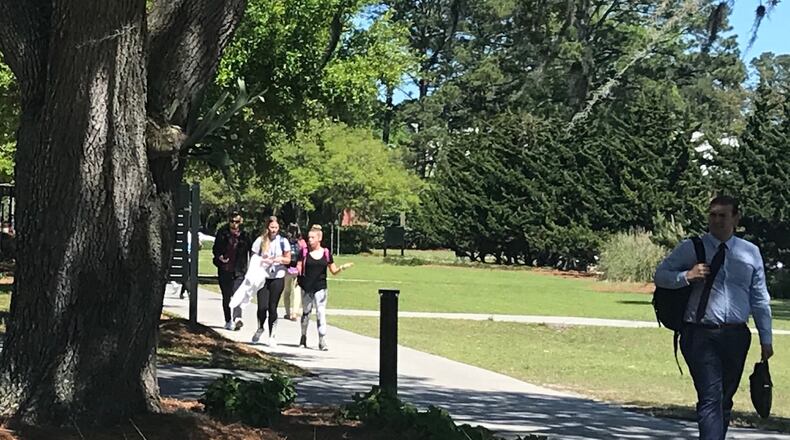SAVANNAH - The Georgia Board of Regents voted Tuesday to raise tuition for the University System of Georgia’s 26 schools this fall, which state officials say is necessary to fund ongoing academic programs and to manage rising costs in areas such as health care and technology.
Tuition will rise by 2.5% this fall, which ranges between $35 and $125 per semester for full-time students. Fees will increase from $4 to $50 per semester for students at 11 schools. Graduate school tuition will rise by 1% to 2%, officials said. Housing costs will also increase by 3% in some dorms while some rates will stay the same.
Online tuition costs will drop by 33% as part of an effort to create uniform rates throughout the system, officials said.
There was no board discussion on the changes. No board members voted against the changes.
Several students at Georgia Southern University’s Savannah campus, where the vote took place, were resigned to the changes.
“There’s nothing you can do about it,” said Anna Caballero, 26, an undergraduate computer science student. “It is what it is.”
“It’s always upsetting to pay more tuition,” Caballero added.
>> RELATED | Georgia students’ struggle to pay tuition puts pressure on lawmakers
Kyle Register, 20, a sophomore majoring in biology, said he wasn’t thrilled about the tuition increase, from $2,665 to $2,732 per semester for Georgia Southern students. Student housing here is as much as $4,000 a semester and will increase by 2% in many dorms. He said the tuition increase is “pretty small” in comparison to the $13,000 he currently owes in student loans.
“I just have to ride with it,” Register said before jumping back on his skateboard.
The 19-member board voted last year not to raise tuition for undergraduate and graduate students after approving a 2% tuition increase in 2017. Last year, the board voted to raise housing costs by an average of 2.5% to 3% for some dorms, about $50 to $100 a semester.
The University System of Georgia budget for the coming fiscal year, which begins July 1, is approximately $2.575 billion, nearly $135 million more than the amended fiscal year budget recently approved by state lawmakers. Still, officials said they are grappling with other rising costs, such as to recruit and retain top faculty members and fund merit increases. More money is also needed, they said, to pay for tools such as data analytics that are being used for programs to help students graduate sooner.
>> READ | Georgia colleges hope earlier, deeper engagement boosts grad rates
“USG will continue building upon systemwide initiatives to ensure on-time college completion, increase student access to free textbooks and reduce student borrowing,” University System of Georgia Chancellor Steve Wrigley said in a statement. “USG institutions are advancing our priorities of affordability, efficiency and degree attainment while continuing to provide students with a high-quality education.”
Education leaders locally and nationally have been under increasing pressure to curb college costs. A 2016 state audit found a 77% increase in the cost of attending a state college or university in the prior 10 years. USG officials noted Tuesday the average annual tuition for all of its schools, about $7,200, is the fourth-lowest total of the 16 public state systems that comprise the Southern Regional Education Board.
The two economic recessions during the 2000s resulted in severe state government cuts to the system, with the percentage of its budget from the state dropping from 75% in 2000 to 47% in 2018. Fiscal year spending per student has increased in recent years as the economy has improved, from about $5,500 in 2012 to more than $7,500 for fiscal year 2019.
Credit: Bob Andres
Credit: Bob Andres
The board also approved a capital budget for campus improvements of more than $260 million for the next fiscal year.
Jennifer Lee, higher education policy analyst of the Georgia Budget & Policy Institute, said she’s not surprised by tuition increases to fund rising personnel costs. She’s eager to see how the system’s efforts to help students graduate sooner, with less student loan debt, will work.
“There is a lot of unmet (student) financial need in the system,” she said.
TUITION INCREASES
Here’s a breakdown of current and upcoming tuition per semester for full-time, in-state students at some metro Atlanta colleges and universities and the University of Georgia, the state’s flagship school.
School, 2018-19 per semester tuition; 2019-20 per semester tuition
Georgia Tech: $5,004; $5,129
University of Georgia: $4,776; $4,895
*Georgia State University: $4,365: $4,474
Kennesaw State University: $2,713; $2,781
University of North Georgia: $2,730; $2,798
Clayton State University: $2,478; $2,540
Atlanta Metropolitan State College: $1,479; $1,516
Source: University System of Georgia.
* The totals are for the main campus.
About the Author
Keep Reading
The Latest
Featured




